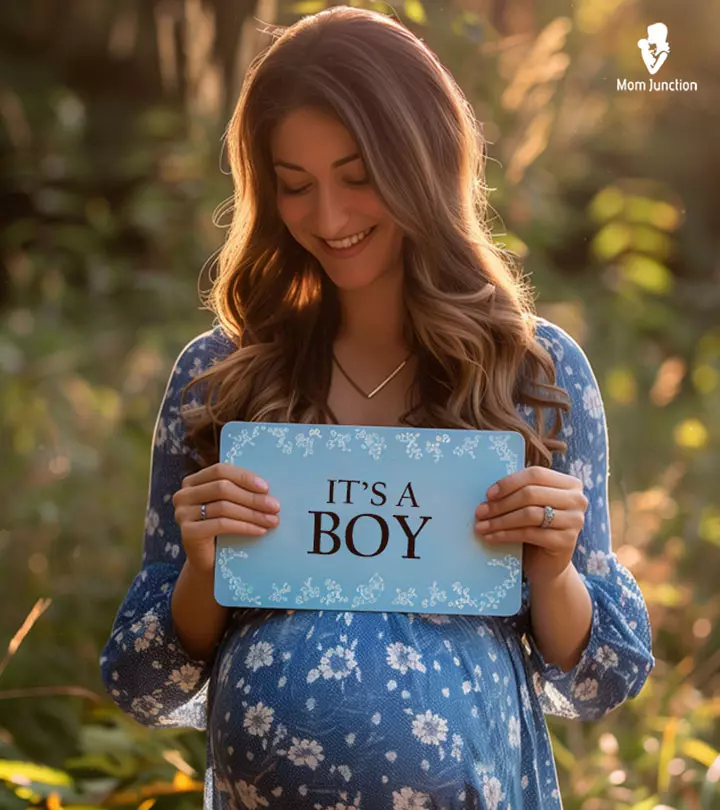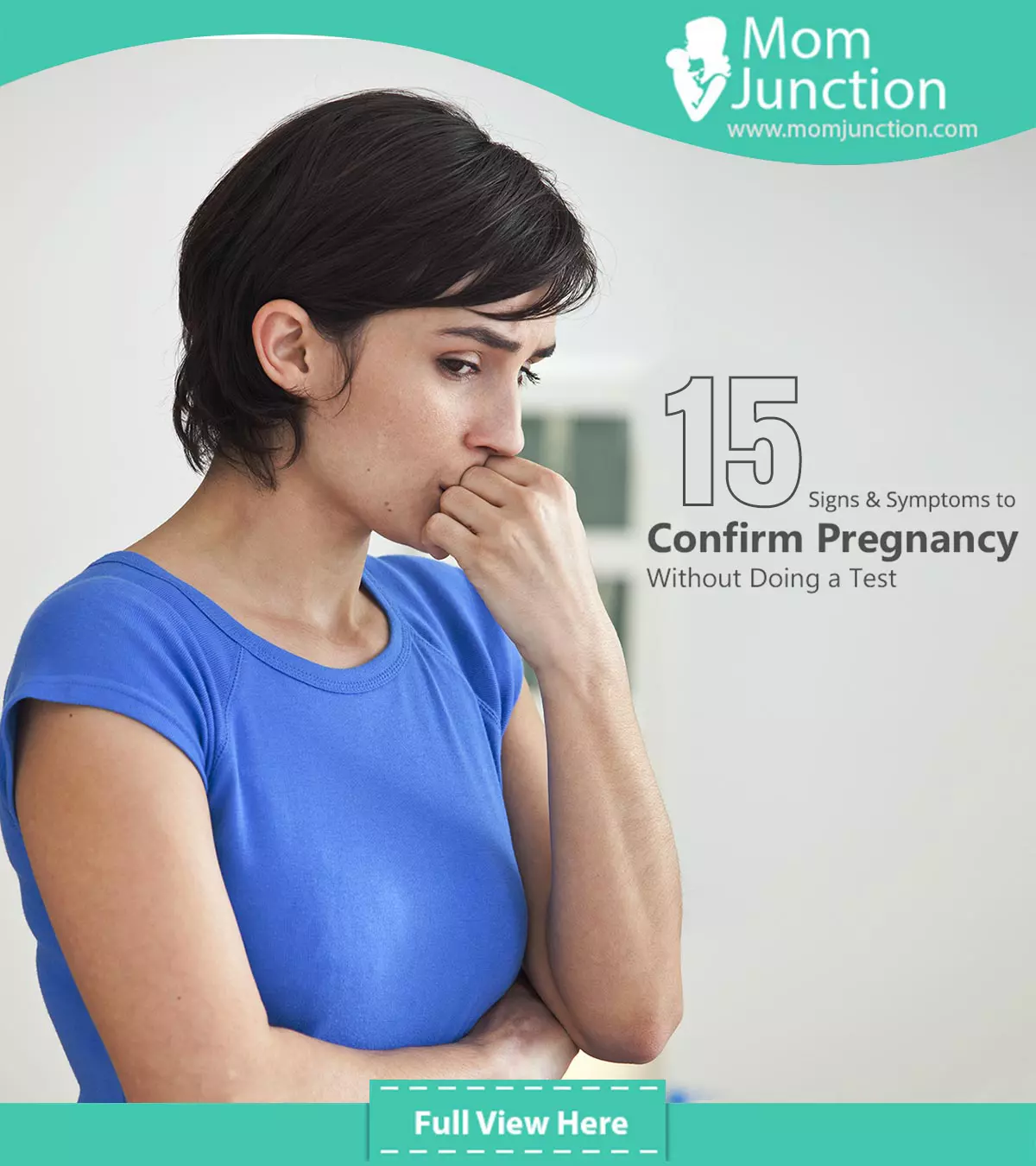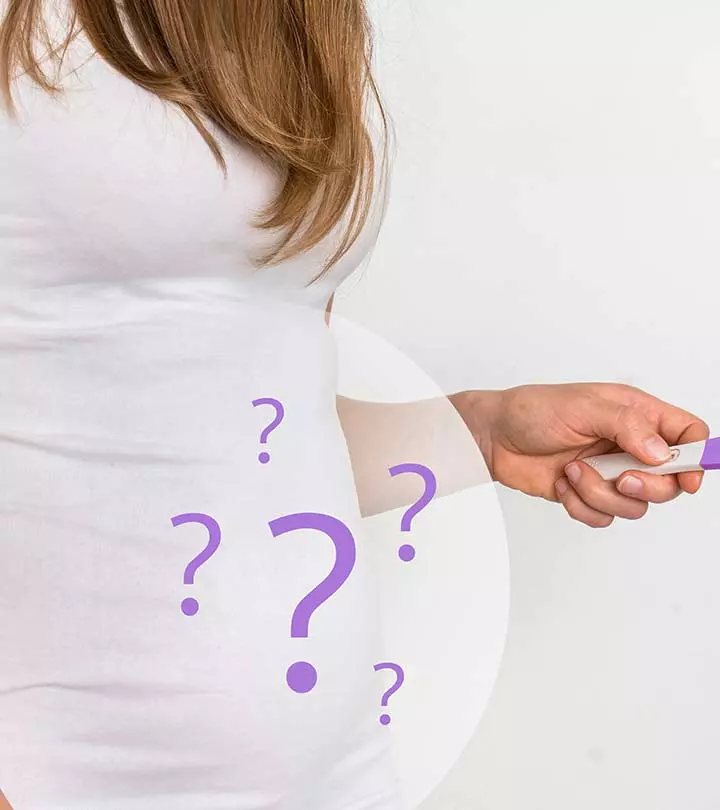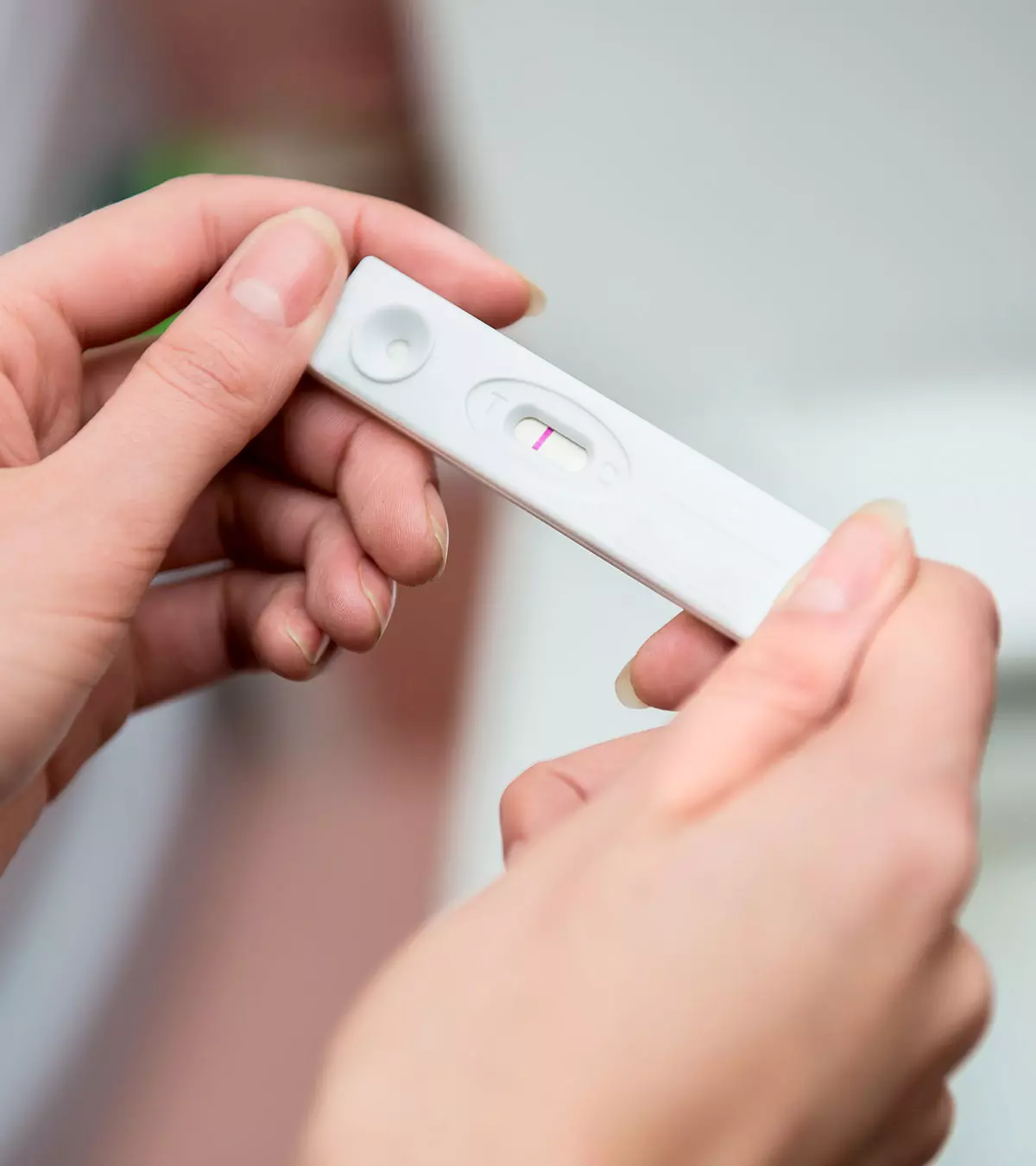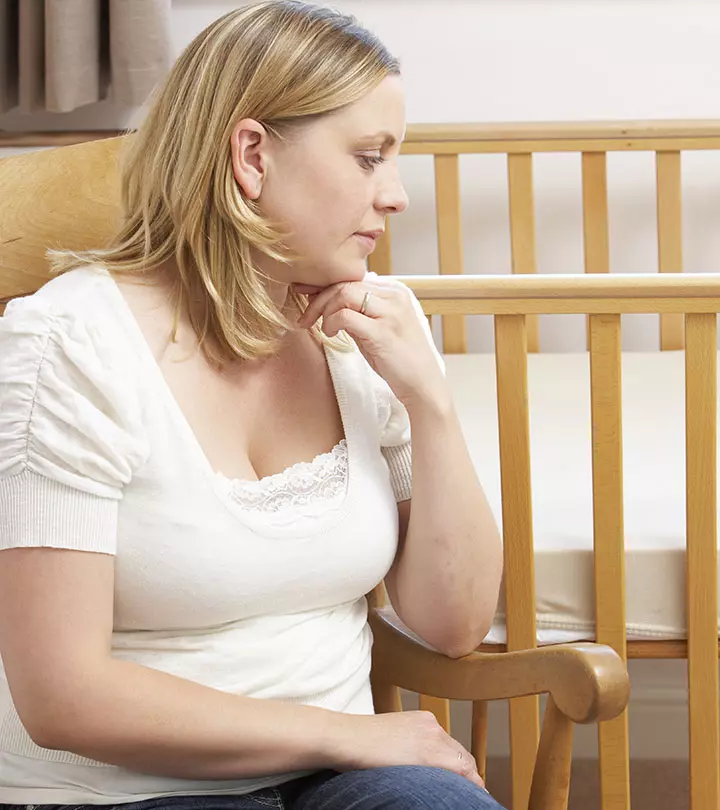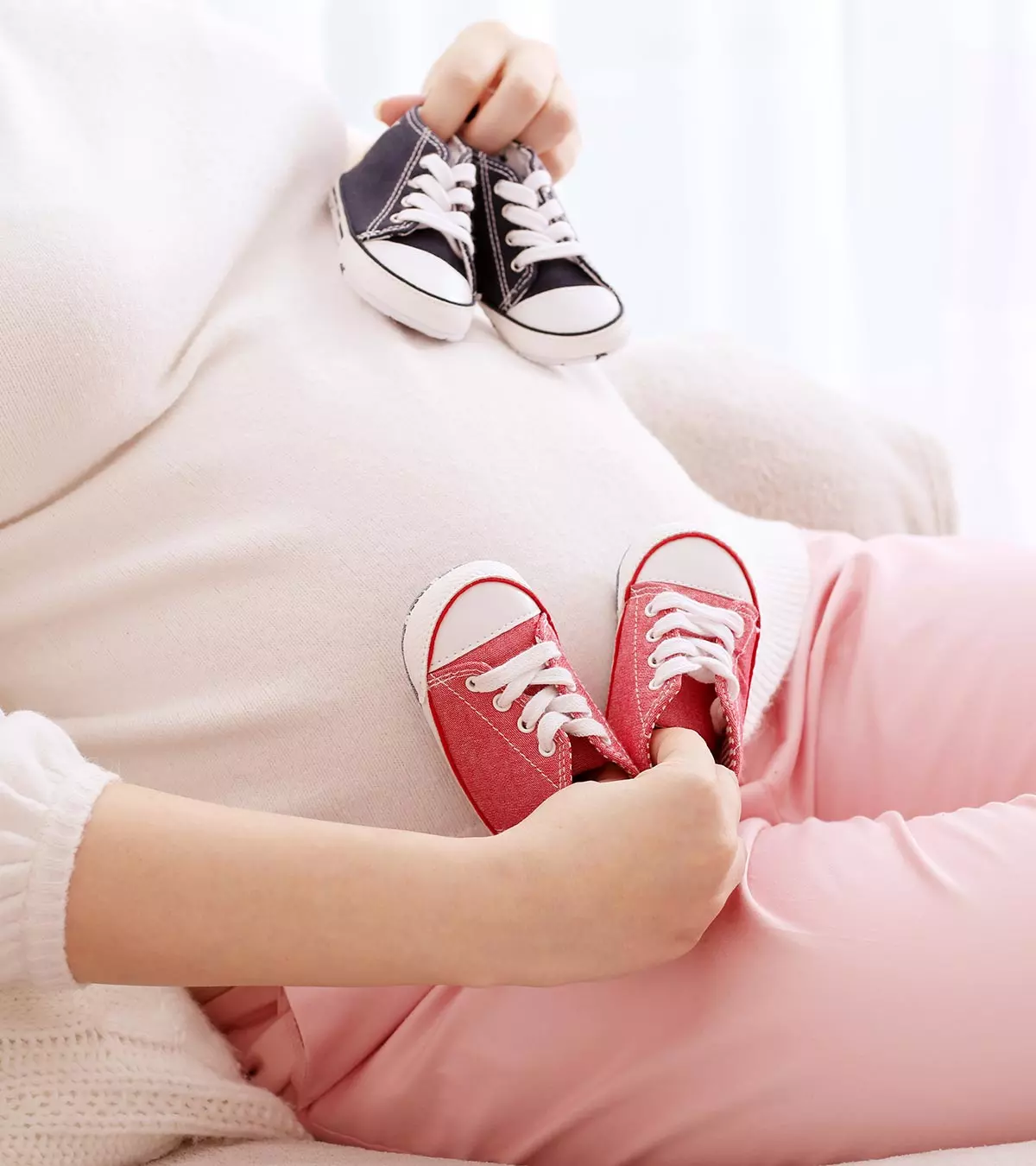
Image: Shutterstock
You could be thinking about the symptoms of twin pregnancy at times. Is it so because you are looking at a bigger bump? An ultrasound scan is a gold standard to confirm the number of babies. When a woman is pregnant, the body begins to make new hormones that bring many changes to accommodate the growing baby to term and deliver. Although there is no conclusive evidence, pregnancy hormones can be higher in twin pregnancy than singleton pregnancy. It may cause early and more apparent pregnancy symptoms in many moms. Keep reading to know the signs and symptoms of twin pregnancy and ways to care for your little ones in the womb.

Key Pointers
- Morning sickness may be more severe in twin pregnancies.
- The uterus develops more rapidly and significantly in twin pregnancies.
- Carrying two babies requires the body to work harder, leading to fatigue.
- Twin pregnancies have higher levels of the hormone human chorionic gonadotropin (hCG).
- Additional weight in the front of the body from carrying two babies can cause back pain.
What Factors Increase The Chances Of Twin Pregnancy?
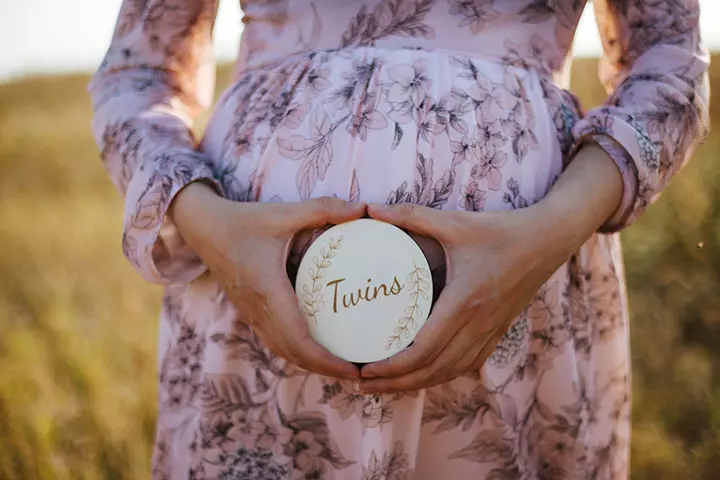
In the United States, twin births make up around 3 percent of all live births, according to the National Institutes of Health (NIH). A few of the likely factors that could increase the chances of a twin pregnancy are:
- Fertility treatment methods. In Assisted Reproductive Techniques (ART) such as IVFiAn assisted reproductive technique where eggs and sperm are processed to form an embryo outside of the body, usually in a lab. (In vitro fertilization), ZIFTiFertility treatment where fertilized eggs are placed directly into the fallopian tubes for implantation. (Zygote intrafallopian transfer), GIFTiFertility treatment where eggs and sperm are placed directly into the fallopian tubes for fertilization. (Gamete intrafallopian transfer), multiple embryos are transferred into the uterus that may lead to twins (1).
- After 30 years of age, a woman’s body produces more FSH (follicle stimulating hormone), which leads to the release of more than one egg from the ovary. This increases the odds of twin pregnancy (2).
- If you are over the average height with a BMI of 30 or higher, the chances of getting pregnant with twins increase (3).
- If you are already a mom to twins then there are chances of success again (3).
 Quick fact
Quick factResearch has noted that the mother’s age may influence the chances of bearing twins. The CDC graph compares the twin birth rates in 1,000 births among women of different age groups in the year 2014 and 2018. Despite the four-year gap, the data consistently showed an increase in the likelihood of having twins as the woman grows older. The twin birth rates in women aged 40 to 54 years were double the twin birth rates among women aged 20 to 24 years.

Twin birth rates by the mothers age in the US
Source: Is Twin Childbearing on the Decline? Twin Births in the United States, 2014–2018 ;CDC
Even if you do not belong to any of the above categories, you might still have a chance to carry twins. So, how would you know if you are pregnant with twins?
Early Signs Of Twin Pregnancy
These early symptoms of twin pregnancy hint you about your twins.
- Higher hCG levels result in extreme morning sickness during the first two weeks of pregnancy (4). In some cases, you might experience extreme morning sickness, which is also termed as hyperemesis gravidarum (3). And, extreme nausea may set in even before missing periods.
- Twin pregnancy translates into fatigue, exhaustion, sleepiness, and lethargy, two to three weeks into pregnancy. As you have to nurture two babies, you need good sleep and sufficient food for your body to work properly (4).
- When you are carrying two babies, your body demands more food for the growing babies. You develop an increased appetite and experience frequent hunger pangs during pregnancy (6).
- Twin pregnant belly is obvious as the bump is bigger than normal. Your uterus might expand more than that of the single fetus mothers as it has to accommodate two babies (6).
- Mood swings become common due to the higher intensity of hormones generated by the body to meet the developmental requirements of your babies. This is easily noticeable from six weeks into pregnancy.
- Pregnancy is detected by the increased level of hCG in the blood or urine. If the level is higher than the normal range, then it is an indication of a twin pregnancy (6).
Recognizing these symptoms is crucial for expectant mothers, as they may suggest the possibility of carrying twins and help facilitate appropriate prenatal care.
Mary Burns, the mother of adorable twin girls, reflects on the challenges of a twin pregnancy. She shares, “Carrying twins is not only double the babies but sometimes double the pregnancy symptoms as well. You name it, and I pretty much experienced it while cooking these kiddos. Morning sickness. Check. Food aversions. Check. Exhaustion. Double check. Uterine cramping, backaches, weird dreams, insomnia, mood swings, acne, anemia requiring iron infusions, heartburn, swelling (oh, the swelling). Did I mention food aversions and exhaustion? Aside from the fact that I was so physically exhausted to the point that I had to stop working out altogether, I had the most intense food aversions for the duration of my pregnancy. They never went away – well, not until literally the day after I gave birth (i).”
 Quick fact
Quick fact
Besides these, there are more signs and symptoms, which differentiate a twin pregnancy for a normal pregnancy.
More Signs And Symptoms Of Twin Pregnancy
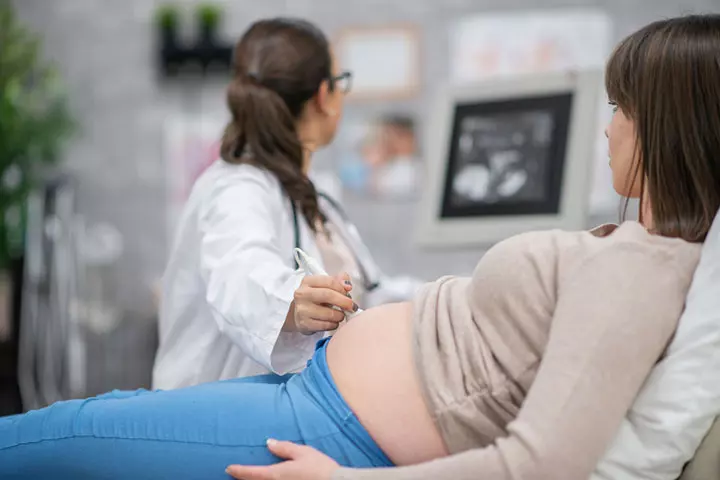
Depending on the early signs, you could decide whether or not you are pregnant with twins. But there are more signs which would help you reach a better conclusion.
- Your doctor regularly checks the fundal height, which is taken from the top of the pubic bone to the top of the uterus. This indicates the development age of the fetus. The fundal height is the measure of the weeks you have progressed in pregnancy. If the measure is more than one centimeter a week, then it may be a sign of twin pregnancy (7).
- Towards the end of the first trimester, the doctors may carry out a test called Doppler heartbeat count to detect the fetal heartbeat. If you are carrying twins, you can hear two hearts beat. However, the Doppler result is less accurate than ultrasound as it is difficult to differentiate one heartbeat from the other (4).
- In twin pregnancy, shortness of breath is an early sign because of the thrust against the diaphragm put by two babies. You must consult your doctor if you feel uncomfortable.
- Cramps are an early sign of twin pregnancy as the uterus enlarges more than normal.
- Preterm labor is common during twin pregnancies and requires immediate medical attention (8).
- Frequent back pains are a result of excess weight gain, uterus enlargement, and excess hormonal activity. Standing straight and holding your chest high can help you relax. Make sure to wear flats and avoid locking your knees while sitting.
- Frequent urination is common during pregnancy. But in case of twin pregnancy it increases because of the pressure exerted by the growing uterus, which is bigger in size, on the bladder. However, do not cut down on the fluid intake because it is necessary to keep your body hydrated. Apart from these, there are a few more signs and symptoms of twin pregnancy that are very similar to regular pregnancy (8).
- You may experience food cravings and aversions and feel nauseated by the smell of certain foods (9).
- Twin pregnancy requires more blood flow for healthy development of babies. The increased blood flow puts pressure on the veins leading to varicose veins generally on the legs. Furthermore, a significant thrust by the baby in the uterus causes pelvic pressure and compression of pelvic parts leading to the enlargement of veins near the vagina (10).
- Digestion issues such as bloating, constipation, and heart burns are an early sign. Avoid spicy and oily foods, keep yourself hydrated, and take small but frequent meals to feel better (10).
- Insomnia or lack of sleep is something that you may experience due to back pain, cramps, edema, indigestion, fatigue, nausea, and vomiting. The best way to sleep while pregnant with twins is on your sides with a pillow between your legs and under your tummy (11).
- During pregnancy, you may have sore, tender, and painful breasts. This is due to the hormonal changes, and the nipples become darker and painfully sensitive. Wearing maternity bras can help reduce the pain (8) (12).
- Twin pregnancy is likely to increase the risk of postpartum depression as it takes the mother more time to adjust to the post-birth schedule (13). Unlike in a regular pregnancy, the mothers in twin pregnancies get doubly exhausted, and have to feed more. Meditation and relaxation techniques along with the right diet can help you out of depression. You could also talk to the moms of twins and learn from their experiences.
A bigger tummy is a prominent sign of twin pregnancy. But does that mean that you should gain more weight than in a normal pregnancy?
How Much Weight Should You Gain When You Are Pregnant With Twins?
Here is the table indicating the required weight gain during pregnancy as per the BMI of the expecting mother (14).
| Pre-pregnancy weight | Body mass index (BMI) | Recommended weight gain (in pounds) |
|---|---|---|
| Underweight | Less than 18.5 | 28–40 |
| Normal Weight | 18.5–24.9 | 25–35 |
| Overweight | 25–29.9 | 15–25 |
| Obese | 30 and greater | 11–20 |
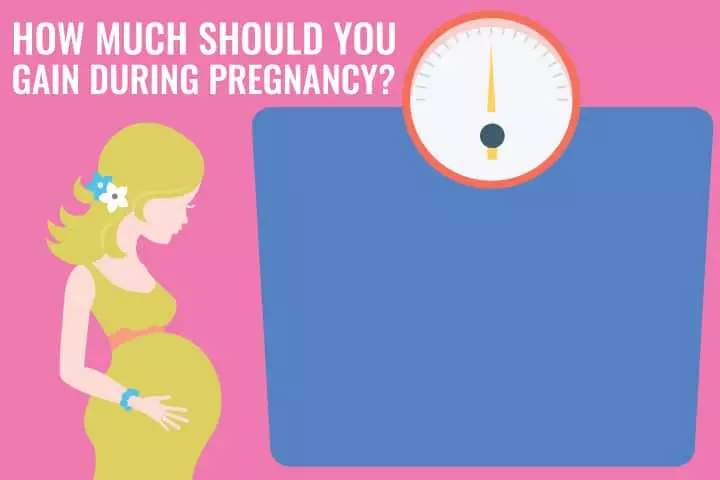
How Can Twin Pregnancy Affect The Babies’ Health
Twin pregnancies can affect babies to an extent. A few health issues include:
- Premature birth: The babies born could be before 37 weeks and need close monitoring (15). This can lead to various health problems in the child. They could develop intestinal problems, and breathing issues. Moreover, long-term problems may include developmental delay, which leads to inability of the child to achieve his/her developmental milestones and underperformance in school.
Jess Wheller, a mother of twins names Xavier and Grace, recounts her experience of premature birth. She shares, “Xavier and Grace were born 10 weeks early. They were 1.4kg and 1.2kg respectively. We didn’t get to hold them when they were born – they were whisked away to the Mercy Hospital Neonatal Intensive Care Unit and hooked up to machines to help them breathe and feed. We didn’t actually get to hold them until two days later (ii).”
- Growth problems in the fetus: Twin pregnancy may be associated with growth problems such as one baby being smaller than the other. If this is the case, the twins are called discordant twins. The growth rate of the fetus could also slow down towards 30 to 32 weeks as there is more demand for nutrients from the babies and it becomes impossible for the placenta to handle the growth. This is called IUGR or Intrauterine Growth Restriction, which results in low birth weights.
Research shows that twin growth discordance is common in multiple pregnancies. It refers to a noticeable weight difference between the two fetuses, with a difference of at least 20% in birth weight considered significant. Around 16% of twin pregnancies show this degree of discordance (16) (17).
- Complications of low birth weight: Babies born with lower birth weight (less than five pounds, eight ounces) are more likely to have health issues such as retinopathy of prematurityiA medical condition that affects the eyes of premature infants due to abnormal growth of blood vessels in the retina. and high blood pressure. IUGR babies are at a risk of developing long-term health problems such as vision and hearing loss, cerebral palsyiA group of chronic disorders that affect movement and muscle tone, caused by damage to the brain before or during birth. , and mental retardation (18) (19).
A study from the University of Palermo in Italy found that in twin pregnancies, 25% to 35% of babies experience intrauterine growth restriction (IUGR) (20).
- Birth defects: Twin pregnancy can cause birth defects in babies impacting their overall body. It may lead to alterations in the bodily functions or may change the shape of the body parts. Multiple babies are more likely to face birth defects compared to single babies.
Research indicates twins have a higher rate of congenital anomalies compared to singletons. The study found 405.8 cases of congenital anomalies per 10,000 twins, whereas the rate for singletons was 238.2 cases per 10,000 (21).
 Research finds
Research finds- Twin to twin transfusion syndrome (TTTS) is a condition in which one placenta is shared between two babies through the formation of an abnormal blood vessel. During this, one baby gets sufficient blood flow depriving the other and putting that baby’s life at risk. However, a laser surgery can treat this condition by sealing the abnormal blood vessels that connect the two babies. AmniocentesisiProcedure used to diagnose a fetus's chromosomal abnormalities, genetic disorders as well as gender determination. is another prenatal test to treat TTTS, where the extra amniotic fluid is drained off from the uterus (22).
- Neonatal death in twin pregnancy is associated with premature births with babies dying within the first 28 days of their birth (23).
Some other complications that may be associated with a twin pregnancy include placenta previa, fetal distress, and vanishing twin syndrome. Additionally, the pregnancy itself can become complicated, and it’s important to be prepared to address any issues that may arise.
Twin Pregnancy And Its Complications

Just like in a normal pregnancy, complications cannot be ruled out in a twin pregnancy. Below, we have mentioned a few potential complications of twin pregnancy (8).
- You may have an early labor pain, resulting from uterine contractions that cause the cervix to open early. You may also experience Braxton Hicks contractions, but it’s important to note that not all women do, and these contractions are not considered a sign of actual labor.
- PreeclampsiaiA pregnancy condition characterized by hypertension and organ damage, which may lead to health issues for the mother and the child. in twin pregnancy is two to three times higher than in single pregnancies (24). Usually, women are bound to have higher blood pressure during twin pregnancy due to extra pressure on the blood walls for more blood. Preeclampsia occurs during the 20th week of pregnancy and proper prenatal care can reduce the severity.
- Iron helps bind oxygen to the blood. The shortage of iron and a high demand for blood and oxygen in the body result in anemia. The doctor usually prescribes iron supplements in such cases.
- A condition called polyhydramnios arises due to excess amniotic fluid present in the uterus, leading to belly pain and breathing trouble (25).
- Gestational diabetes is a result of an increased size of two placenta, higher hormonal levels of both the placenta, and increased resistance to insulin by the placenta. If left untreated, it can lead to severe problems in the mother and babies. Change in diet plans and close monitoring of insulin levels can prevent this.
- Intrauterine fetal loss is a rare situation, where one of the two fetuses dies inside the uterus. The doctor takes a call on whether or not to surgically birth the demised fetus (26).
- In the case of obstetric cholestasis, irregular bile flow causes excess bile salts to build up in the bloodstream. Proper medication and regular monitoring will help treat this condition effectively. Cutting down on fatty foods and alcohol prevents this situation (27).
Twin pregnancies usually carry a higher risk of complications, necessitating close and frequent prenatal visits. Therefore, it’s important to have careful monitoring and proper prenatal care to manage these risks effectively (8). There could be other complications that are similar to those in a single pregnancy. The doctor should be able to help you with them.
Katie Sagaser, an ABGC-board certified genetic counselor from San Diego, California, says, “While twin pregnancies have higher baseline risks for complications than singleton pregnancies, not all of them are high-risk pregnancies. Therefore, a referral to a maternal-fetal medicine (MFM) specialist may be recommended but it is not immediately guaranteed as soon as you find out you’re having twins.
“Towards the end of your second trimester, your provider will likely want to see you more frequently than someone pregnant with a singleton since twin pregnancies have higher risks of pre-eclampsia and preterm labor.”
How To Deal With Twin Pregnancy Stress?

Here are some simple tips to cope with the situation. Ask for help from your family and friends as you need a lot of support during this period.
- Talk with other moms who have twins. Try to understand their experiences and how they dealt with any problems that came along. This may help you take the right steps.
- During twin pregnancy, you will feel extremely exhausted. Therefore, get sufficient sleep.
- In the case of depression, talk to your doctor. He can suggest ways to overcome it. You could also seek your family’s help.
- If you are a working woman, make sure to take maternity leave as soon as possible. Towards the delivery, you may experience discomforts, and rest is of utmost priority at this stage.
 Point to consider
Point to consider- Eat well and do gentle exercises such as walking as it will help you overcome stress.
- During twin pregnancy, you can expect an early delivery. Therefore, plan for it in advance and get everything in place and organized at home.
Carrying two lives inside you is nothing less than a magical experience. Holding your babies after all the battles makes the pain wane. But during your journey of pregnancy, make sure you take care of yourself, and get the health check-ups done regularly.
Frequently Asked Questions
1. Is bleeding during the first weeks of twin pregnancy normal?
You may observe brown spotting or light to heavy bleeding during your twin pregnancy. While this is common and could be due to the low lying placenta, do check with your doctor. The bleeding, however, disappears after some period (28).
2. Can I get a false negative pregnancy test with twins?
Doing the pregnancy test too early, even before implantation, may give you a negative result. This is mostly because the home pregnancy test is unable to detect the low hCG level in the urine. You can wait for a few days and do the test again (29).
3. I got a positive pregnancy test five days before a missed period. Am I expecting twins?
While carrying twins, it is possible to have higher hCG levels than the normal range. So, there are chances to get a positive result when you take the pregnancy test a few days before your missed period (30).
4. I am pregnant with twins. What foods should I eat during this period?
Your diet must be rich in protein, calcium, folic acid, and iron. Make sure to take multi vitamins prescribed by your doctor, every day. Eat healthily and avoid junk foods (31).
5. What kind of activities must I get involved in during twin pregnancy?
You should avoid activities such as jogging or aerobics, as they are physically straining. However, activities such as swimming, yoga, and walking can be good for you (31).
6. How is a twin pregnancy confirmed?
Prenatal ultrasound is the most dependable way to confirm a twin pregnancy. It uses sound waves to generate images of the uterus, which helps doctors identify if there are two babies (8).
7. At what stage do twins form?
During pregnancy, the formation of identical twins starts at the blastocyst stage after four to six days of fertilization (32). On the other hand, fraternal twins form when two separate eggs are fertilized by two individual sperms (1).
8. What is the position of twins in the womb?
The twins’ position in the womb may vary and change throughout the pregnancy. However, most twin babies lie in a heads-down position in the womb (33). It is because the womb doesn’t have much space to accommodate both the babies in feet or bottom-down positions.
9. Can you have twins through vaginal birth?
Yes. While a planned cesarean delivery is typically considered when having twins, it is possible to deliver twins vaginally (33). In rare cases, a mother can deliver one baby vaginally and the other twin through a cesarean section (34).
10. What should you not do when pregnant with twins?
As with normal pregnancy, women with twins should avoid a few things, including lifting heavy things, high-moderate exercises, drinking alcohol, nicotine consumption, and unhealthy eating habits (31).
While pregnancy is a joyous occasion that brings happiness to one’s family, having twins doubles the joy. Pregnancy after the age of 30, through fertility treatments, or if you have a history of twins, increases your chances of having twins. There are specific early symptoms of twin pregnancy that you can look for, including severe morning sickness, increased lethargy, exhaustion, mood changes, and higher than usual hCG levels in blood or urine samples. Twin pregnancy also comes with more risks and complications, so make sure to get enough rest, take precautions, avoid stress, eat a balanced pregnancy diet, and adhere to your prenatal appointments.
Infographic: Early Signs That You Might Be Having Twins
Several signs may indicate a twin pregnancy during the early stages. While not all women pregnant with twins experience these symptoms, the following infographic highlights some of the most common signs to watch out for. Keep in mind that the only way to confirm a twin pregnancy is with an ultrasound, so if you suspect you are carrying twins, be sure to speak with your doctor for proper diagnosis and care. Illustration: Momjunction Design Team
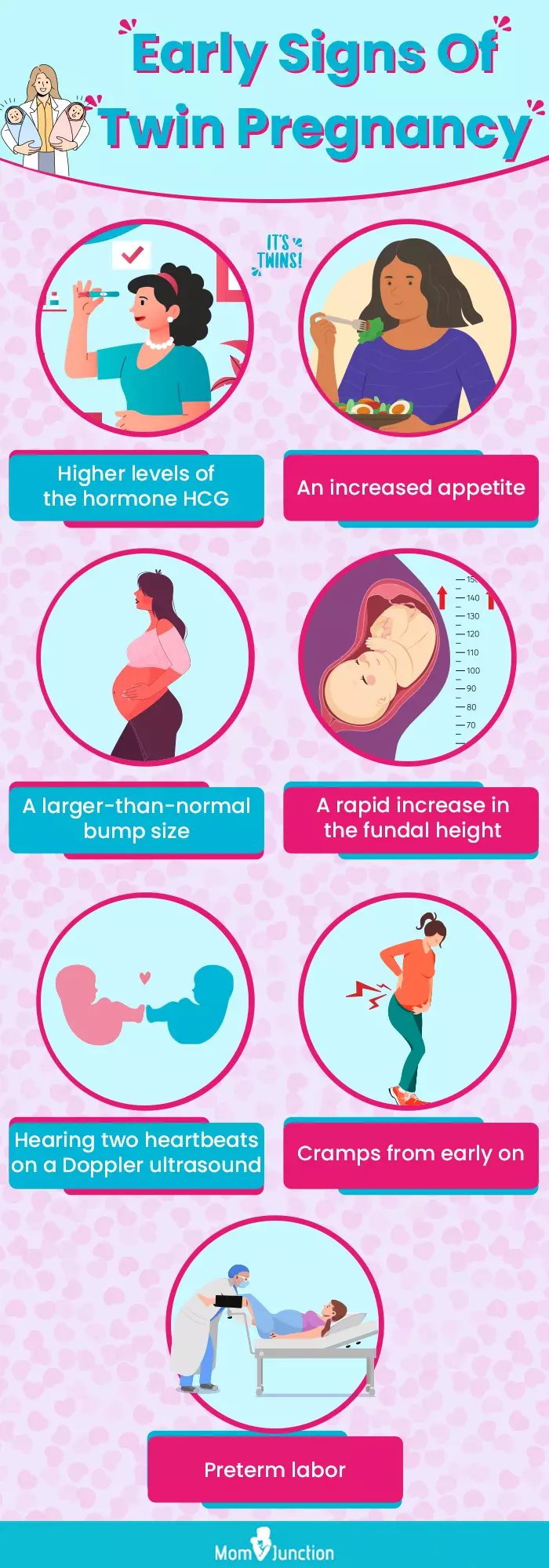
Illustration: Early Signs And Symptoms Of A Twin Pregnancy
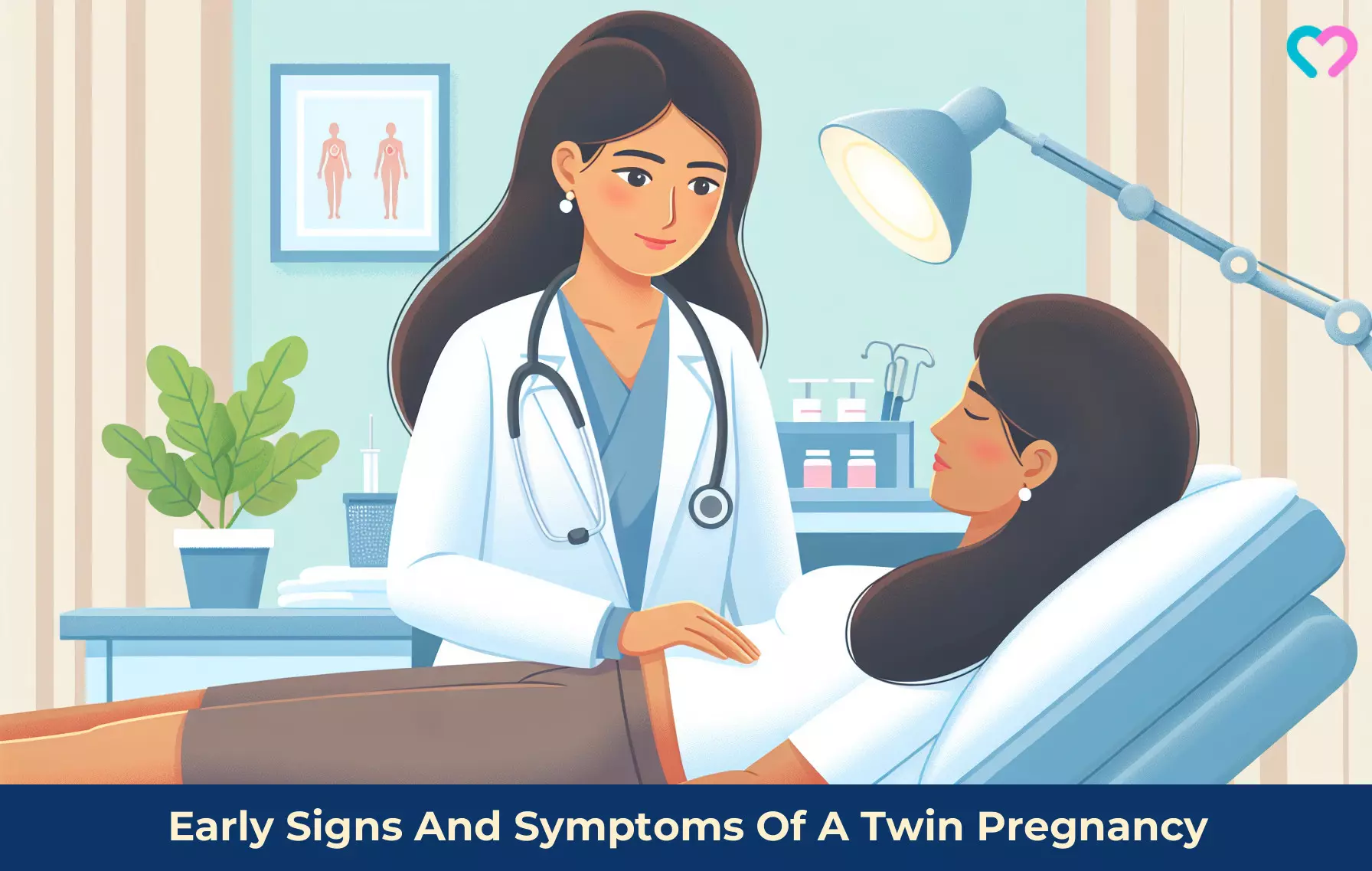
Image: Dall·E/MomJunction Design Team
Personal Experience: Source
MomJunction articles include first-hand experiences to provide you with better insights through real-life narratives. Here are the sources of personal accounts referenced in this article.
i. Twin Pregnancy Struggles.https://adventurethemyoung.com/2016/05/26/twin-pregnancy-struggles/
ii. My twins were born 10 weeks premature;
https://www.mcri.edu.au/impact/meet-our-child-health-heroes/patient-stories/my-twins-were-born-10-weeks-premature#:~:text=Having%20a%20%E2%80%AA%20premature%20baby,all%20my%20days%20in%20hospital
References
- Twins and multiple births.
https://www.betterhealth.vic.gov.au/health/conditionsandtreatments/twins-identical-and-fraternal - C. B. Benson et al.; (1993); Outcome of twin gestations following sonographic demonstration of two heart beats in the first trimester.
https://obgyn.onlinelibrary.wiley.com/doi/pdf/10.1046/j.1469-0705.1993.03050343.x - Expecting Twins or Triplets.
https://my.clevelandclinic.org/health/articles/9710-expecting-twins-or-triplets - Twins Pregnancy Symptoms.
https://americanpregnancy.org/healthy-pregnancy/multiples/twin-pregnancy-symptoms/ - Hyperemesis gravidarum.
https://medlineplus.gov/ency/article/001499.htm - Symptoms and Diagnosis of Multiple Pregnancy.
https://www.hopkinsmedicine.org/health/conditions-and-diseases/staying-healthy-during-pregnancy/symptoms-and-diagnosis-of-multiple-pregnancy - Fundal Height.
https://my.clevelandclinic.org/health/diagnostics/22294-fundal-height - Twin Pregnancy.
https://my.clevelandclinic.org/health/articles/23158-twin-pregnancy - Appetite changes and food aversions during pregnancy.
https://www.pregnancybirthbaby.org.au/appetite-changes-and-food-aversions-during-pregnancy - Healthy multiple pregnancy.
https://twinstrust.org/information/pregnancy-and-birth/healthy-multiple-pregnancy.html - María de la Calle, et al.; Assessment of Sleep Quality in Spanish Twin Pregnancy: An Observational Single-Center Study.
https://www.cambridge.org/core/journals/twin-research-and-human-genetics/article/assessment-of-sleep-quality-in-spanish-twin-pregnancy-an-observational-singlecenter-study/EEDB79AE1332427CB39142D3CB95A64F - Sore Nipples.
https://my.clevelandclinic.org/health/symptoms/23164-sore-nipples - Twins and postnatal depression.
https://www.nhs.uk/conditions/baby/newborn-twins-and-multiples/twins-and-postnatal-depression/ - Weight Gain During Pregnancy.
https://www.acog.org/clinical/clinical-guidance/committee-opinion/articles/2013/01/weight-gain-during-pregnancy?utm_source=redirect&utm_medium=web&utm_campaign=otn - Understanding Risks of a Multiple Pregnancy.
https://www.urmc.rochester.edu/encyclopedia/content?ContentTypeID=85&ContentID=P08021 - Xiang H. Huang X. Zhu J. et al.; Physical growth and intelligence development of discordant dizygotic twins from birth to preschool age: a prospective cohort study.
https://ijponline.biomedcentral.com/articles/10.1186/s13052-022-01354-y - Miller Jena et al.; Discordant Twins: Diagnosis Evaluation and Management.” American Journal of Obstetrics and Gynecology.
https://www.ajog.org/article/S0002-9378(11)00822-2/abstract#:~:text=Abstractmaternal%2C%20fetal%2C%20or%20placental - Neurodevelopmental Outcomes following Intrauterine Growth Restriction and Very Preterm Birth.
https://www.jpeds.com/article/S0022-3476%2821%2900667-3/pdf - Morsing Eva et al. Cognitive Function After Intrauterine Growth Restriction and Very Preterm Birth.
https://publications.aap.org/pediatrics/article-abstract/127/4/e874/65194/Cognitive-Function-After-Intrauterine-Growth?autologincheck=redirected - Puccio Giuseppe, et al.; Intrauterine Growth Pattern and Birthweight Discordance in Twin Pregnancies: A Retrospective Study.
https://pmc.ncbi.nlm.nih.gov/articles/PMC4018970/ - Glinianaia S. V. et al. Congenital Anomalies in Twins: A Register-based Study.
https://academic.oup.com/humrep/article-abstract/23/6/1306/587935?redirectedFrom=fulltext&login=false - Twin-to-Twin Transfusion Syndrome (TTTS).
https://www.hopkinsmedicine.org/health/conditions-and-diseases/twintotwin-transfusion-syndrome-ttts - Tanya Marchant et al.; (2012); Neonatal Mortality Risk Associated with Preterm Birth in East Africa Adjusted by Weight for Gestational Age: Individual Participant Level Meta-Analysis.
https://www.ncbi.nlm.nih.gov/pmc/articles/PMC3419185/ - Yuval Bdolah et al.; (2008); Twin pregnancy and the risk of preeclampsia: bigger placenta or relative ischemia?
https://www.ajog.org/article/S0002-9378(07)01701-2/fulltext - Low Birth Weight.
https://www.stanfordchildrens.org/en/topic/default?id=low-birth-weight-90-P02382 - Intrauterine Fetal Demise.
https://www.ncbi.nlm.nih.gov/books/NBK557533/ - Axelsen Silja M. et al. The Effect of Twin Pregnancy in Intrahepatic Cholestasis of Pregnancy: A Case Control Study.
https://obgyn.onlinelibrary.wiley.com/doi/10.1111/aogs.14928 - What Should I Expect When I’m Expecting Twins (Or More)?
https://intermountainhealthcare.org/blogs/what-should-i-expect-when-im-expecting-twins - Pregnancy Tests.
https://my.clevelandclinic.org/health/diagnostics/9703-pregnancy-tests - hCG levels.
https://www.pregnancybirthbaby.org.au/hcg-levels - Being pregnant with twins triplets and other multiples.
https://www.marchofdimes.org/find-support/topics/pregnancy/being-pregnant-twins-triplets-and-other-multiples - Laila Noli et al.; (2015); Discordant Growth of Monozygotic Twins Starts at the Blastocyst Stage: A Case Study.
https://www.ncbi.nlm.nih.gov/pmc/articles/PMC4682124/ - Twins and multiple births
https://www.nhsinform.scot/ready-steady-baby/pregnancy/your-baby-s-development/twins-and-multiple-births - Giving birth to twins or more
https://www.nhs.uk/pregnancy/labour-and-birth/what-happens/giving-birth-to-twins-or-more/ - Multiple Pregnancy and Birth: Twins Triplets and High Order Multiples (booklet).
https://www.reproductivefacts.org/news-and-publications/patient-fact-sheets-and-booklets/documents/fact-sheets-and-info-booklets/multiple-pregnancy-and-birth-twins-triplets-and-high-order-multiples-booklet/
Community Experiences
Join the conversation and become a part of our nurturing community! Share your stories, experiences, and insights to connect with fellow parents.
Read full bio of Dr. Sangeeta Agrawal

Katie Sagaser is the Director of Genetic Counseling at Juno Diagnostics. She is also an ABGC-board certified genetic counselor. Prior to joining JunoDx, she was an assistant professor of Gynecology & Obstetrics in the Division of Maternal Fetal Medicine at the Johns Hopkins University School of Medicine, where she worked as a reproductive genetic counselor for 6.5 years.
Katie Sagaser is the Director of Genetic Counseling at Juno Diagnostics. She is also an ABGC-board certified genetic counselor. Prior to joining JunoDx, she was an assistant professor of Gynecology & Obstetrics in the Division of Maternal Fetal Medicine at the Johns Hopkins University School of Medicine, where she worked as a reproductive genetic counselor for 6.5 years.
Read full bio of shreeja pillai
Read full bio of Rebecca Malachi
Read full bio of Reshmi Das







